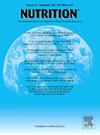Changes in gut microbiota diversity and composition during feeding transitions in infants: A scoping review
IF 3.2
3区 医学
Q2 NUTRITION & DIETETICS
引用次数: 0
Abstract
Infants experience significant changes in gut microbiota during the first year of life as they transition from exclusive milk consumption to solid foods. The purpose of this study is to explore how dietary changes in infancy influence gut microbiota composition and diversity. A scoping review was conducted using databases including PubMed, Web of Science, Ovid Medline, Science Direct, and ProQuest. English-language studies published between 2003 and 2023 were included if they focused on mothers and caregivers with children aged 0 to 23 months involved in Infant and Young Child Feeding practices. A total of 561 studies were identified, with 15 articles included for data extraction. Significant differences in gut microbiota diversity related to feeding practices were observed. Infants who were exclusively breastfeding (EBF) exhibited lower phylogenetic diversity (5.8 ± 1.3, P < 0.05) compared to non-EBF infants (6.4 ± 1.8, P < 0.05). The EBF infants showed significantly (P < 0.05) higher levels of beneficial bacteria, such as Bifidobacterium, while non-EBF infants had elevated levels of potentially pathogenic genera, including Bacteroides and Clostridium. Additionally, earlier introduction of complementary foods was associated with increased alpha diversity (mean difference = 0.40, 95% CI: 0.25, 0.55), and dietary factors such as total energy intake, carbohydrate, and fiber significantly correlated with gut microbial diversity (P < 0.05). These results imply that the type of feeding, timing of introduction, and type of food intake during complementary feeding have a significant impact on the infant’s gut microbiota diversity and composition. Future research could explore the long-term implications of these early dietary exposures on metabolic function and immune system health.
婴儿喂养过渡期间肠道微生物群多样性和组成的变化:一项范围综述
婴儿在生命的第一年经历了肠道微生物群的重大变化,因为他们从纯牛奶消费过渡到固体食物。本研究的目的是探讨婴儿饮食变化如何影响肠道菌群组成和多样性。使用PubMed、Web of Science、Ovid Medline、Science Direct和ProQuest等数据库进行范围审查。2003年至2023年间发表的英语研究,如果重点关注0至23个月儿童的母亲和照顾者参与婴幼儿喂养实践,则纳入其中。共纳入561篇研究,其中15篇纳入数据提取。观察到与饲养方式相关的肠道微生物群多样性存在显著差异。纯母乳喂养(EBF)婴儿的系统发育多样性较低(5.8±1.3,P <;0.05)与非ebf婴儿相比(6.4±1.8,P <;0.05)。EBF患儿表现出显著的(P <;0.05)有益菌(如双歧杆菌)水平较高,而非ebf婴儿的潜在致病菌(包括拟杆菌和梭状芽胞杆菌)水平较高。此外,早期引入辅食与增加α多样性相关(平均差值= 0.40,95% CI: 0.25, 0.55),膳食因素如总能量摄入、碳水化合物和纤维与肠道微生物多样性显著相关(P <;0.05)。这些结果表明,在补充喂养期间,喂养类型、引入时间和食物摄入类型对婴儿肠道微生物群的多样性和组成有显著影响。未来的研究可以探索这些早期饮食暴露对代谢功能和免疫系统健康的长期影响。
本文章由计算机程序翻译,如有差异,请以英文原文为准。
求助全文
约1分钟内获得全文
求助全文
来源期刊

Nutrition
医学-营养学
CiteScore
7.80
自引率
2.30%
发文量
300
审稿时长
60 days
期刊介绍:
Nutrition has an open access mirror journal Nutrition: X, sharing the same aims and scope, editorial team, submission system and rigorous peer review.
Founded by Michael M. Meguid in the early 1980''s, Nutrition presents advances in nutrition research and science, informs its readers on new and advancing technologies and data in clinical nutrition practice, encourages the application of outcomes research and meta-analyses to problems in patient-related nutrition; and seeks to help clarify and set the research, policy and practice agenda for nutrition science to enhance human well-being in the years ahead.
 求助内容:
求助内容: 应助结果提醒方式:
应助结果提醒方式:


